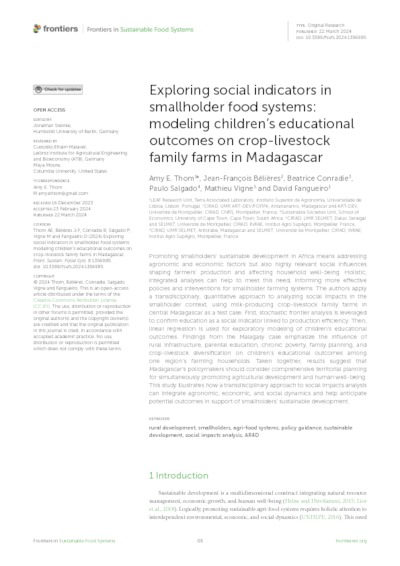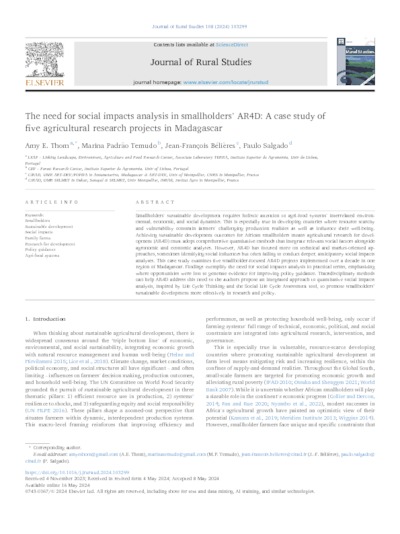Promoting smallholders’ sustainable development in Africa means addressing agronomic and economic factors but also highly relevant social influences shaping farmers’ production and affecting household well-being. Holistic, integrated analyses can help to meet this need, informing more effective policies and interventions for smallholder farming systems. The authors apply a transdisciplinary, quantitative approach to analyzing social impacts in the smallholder context, using milk-producing crop-livestock family farms in central Madagascar as a test case. First, stochastic frontier analysis is leveraged to confirm education as a social indicator linked to production efficiency. Then, linear regression is used for exploratory modeling of children’s educational outcomes. Findings from the Malagasy case emphasize the influence of rural infrastructure, parental education, chronic poverty, family planning, and crop-livestock diversification on children’s educational outcomes among one region’s farming h
Exploring social indicators in smallholder food systems: modeling children's educational outcomes on crop-livestock family farms in Madagascar
The need for social impacts analysis in smallholders’ AR4D: A case study of five agricultural research projects in Madagascar
Smallholders’ sustainable development requires holistic attention to agri-food systems’ interrelated environ mental, economic, and social dynamics. This is especially true in developing countries where resource scarcity and vulnerability constrain farmers’ challenging production realities as well as influence their well-being. Achieving sustainable development outcomes for African smallholders means agricultural research for devel opment (AR4D) must adopt comprehensive quantitative methods that integrate relevant social factors alongside agronomic and economic analyses. However, AR4D has focused more on technical and market-oriented ap proaches, sometimes identifying social influences but often failing to conduct deeper, anticipatory social impacts analyses. This case study examines five smallholder-focused AR4D projects implemented over a decade in one region of Madagascar. Findings exemplify the need for social impacts analysis in practical terms, emphasizing where opportunities were lost to generate evidence for improving policy guidance. Transdisciplinary methods can help AR4D address this need so the authors propose an integrated approach to quantitative social impacts analysis, inspired by Life Cycle Thinking and the Social Life Cycle Assessment tool, to promote smallholders’ sustainable development more effectively in research and policy.


